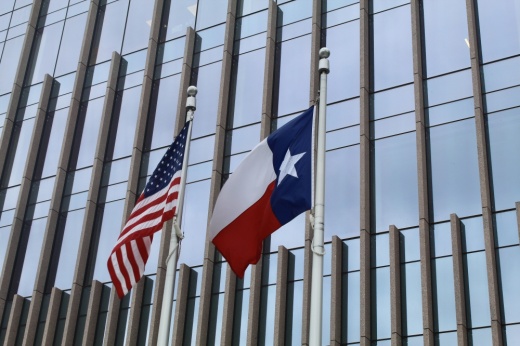Several border security measures and a law banning private COVID-19 vaccine mandates will also go into effect in early 2024.
From tax exemptions to a ban on diversity offices at public universities, here is a look at several new state laws that took effect on New Year’s Day.
The details
Senate Bill 17 bans diversity, equity and inclusion offices at public colleges and universities across Texas. Public institutions can no longer have programs or policies “designed or implemented in reference to race, color, ethnicity, gender identity, or sexual orientation,” according to the bill.
All public institutions must dissolve their DEI programs and cannot reinstate them in the future.
SB 17 was a top priority of Lt. Gov. Dan Patrick, who oversees the Texas Senate, and Republican lawmakers. In a statement of intent, bill author Sen. Brandon Creighton, R-Conroe, wrote that some DEI programs “are polarizing and work against the goal of inclusion.”
Critics of the controversial new law expressed concerns that it eliminates important resources for students of color.
“The absence of dedicated resources for DEI initiatives risks creating a void in addressing systemic inequalities and fostering an inclusive learning environment for all students,” the Texas Legislative Black Caucus and others said in a statement.
The new law does not impact student recruitment and admissions, research or the courses offered at public institutions.
Senate Bill 3 eliminates the state’s business franchise tax for roughly 67,000 small and midsize businesses.
The law doubled the franchise tax exemption from about $1.24 million to $2.47 million. Entities that make less than $2.47 million annually no longer have to pay the tax or submit a “no tax due” form.
Collectively, qualifying businesses are expected to save around $300,000 per year, lawmakers said.
House Bill 4077 automatically gives a homestead exemption to homeowners age 65 or older. Previously, elderly homeowners had to request exemptions from their local appraisal districts.
Senate Bill 1381 allows certain local tax exemptions to automatically roll over to a person’s spouse if they are at least 65 years old when they die.
House Bill 4758 cracks down on e-cigarette companies that market to minors. The new law makes it a Class B misdemeanor to market, advertise or sell e-cigarettes that use images of cartoon characters, celebrities or food.
Companies that do so could face up to 180 days in jail, a $2,000 fine or both.
In 2023, 4.6% of middle school students and 10% of high school students reported that they vaped, according to the National Youth Tobacco Survey.
“The Department of State Health Services determined that e-cigarette use had reached epidemic status among teens back in 2018,” lawmakers wrote in an analysis of HB 4758.
House Bill 3186 creates a diversion program for at-risk youth charged with Class C misdemeanors, such as the possession of alcohol or theft of something worth less than $100.
The bipartisan legislation, known as the Texas Youth Diversion and Early Intervention Act, allows judges to send minors to a new intervention program instead of fining them. Local governments can adopt a variety of options, including rehabilitation programs, alcohol and drug awareness courses, job trainings, academic tutoring and more.
“These proposed changes intend to help identify at-risk youth and those living with mental illness, and to keep such youth from spiraling deeper into the criminal justice system, all while holding them accountable for their actions,” according to the bill analysis.
Children will be eligible for diversion programs once a year and may not enter a program if they already unsuccessfully participated. A child and their parent must provide written consent to participate in the programs.
House Bill 2323 creates a new specialty license plate commemorating the 100th anniversary of the official state song, “Texas, Our Texas.” The new plate will feature the song’s title and the years 1924-2024.
Stay tuned
Two new laws from the third special legislative session will take effect Feb. 6.
Senate Bill 4 increases criminal penalties for smuggling humans and harboring undocumented immigrants in “stash houses.” Senate Bill 7 prohibits private companies from requiring that their employees or contractors be vaccinated against COVID-19. Government entities are already banned from enforcing vaccine mandates, mask requirements and related school closures under a law that went into effect Sept. 1.
During the fourth special session, lawmakers passed two border bills that will become law March 5.
Senate Bill 3 sets aside $1.54 billion to help the state continue building a wall along the Texas-Mexico border. Lawmakers estimated the money would fund about 100 miles of new border wall. So far, over 16 miles of wall have been built, and 33 miles are in the works, Gov. Greg Abbott said at a Dec. 18 news conference.
Senate Bill 4 will allow Texas to arrest and deport migrants who enter the state illegally. Currently, only the federal government has the authority to deport migrants.
El Paso County and two immigrant rights organizations sued Texas on Dec. 19, arguing the controversial new law is unconstitutional because it violates the federal government’s immigration authority.
Abbott said Dec. 18 he believed Texas has the right to create and enforce its own immigration laws, citing a “border crisis.” He also said the new law was crafted to avoid delays in court.
In a statement announcing the lawsuit, Adriana Piñon, the legal director of the American Civil Liberties Union of Texas, said SB 4 was “one of the most extreme anti-immigrant bills in the country.”





